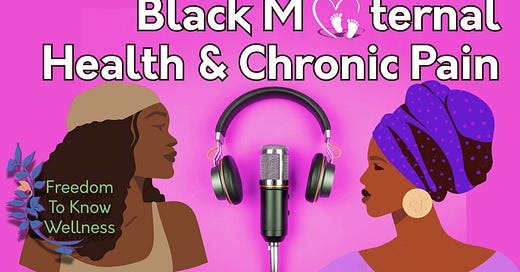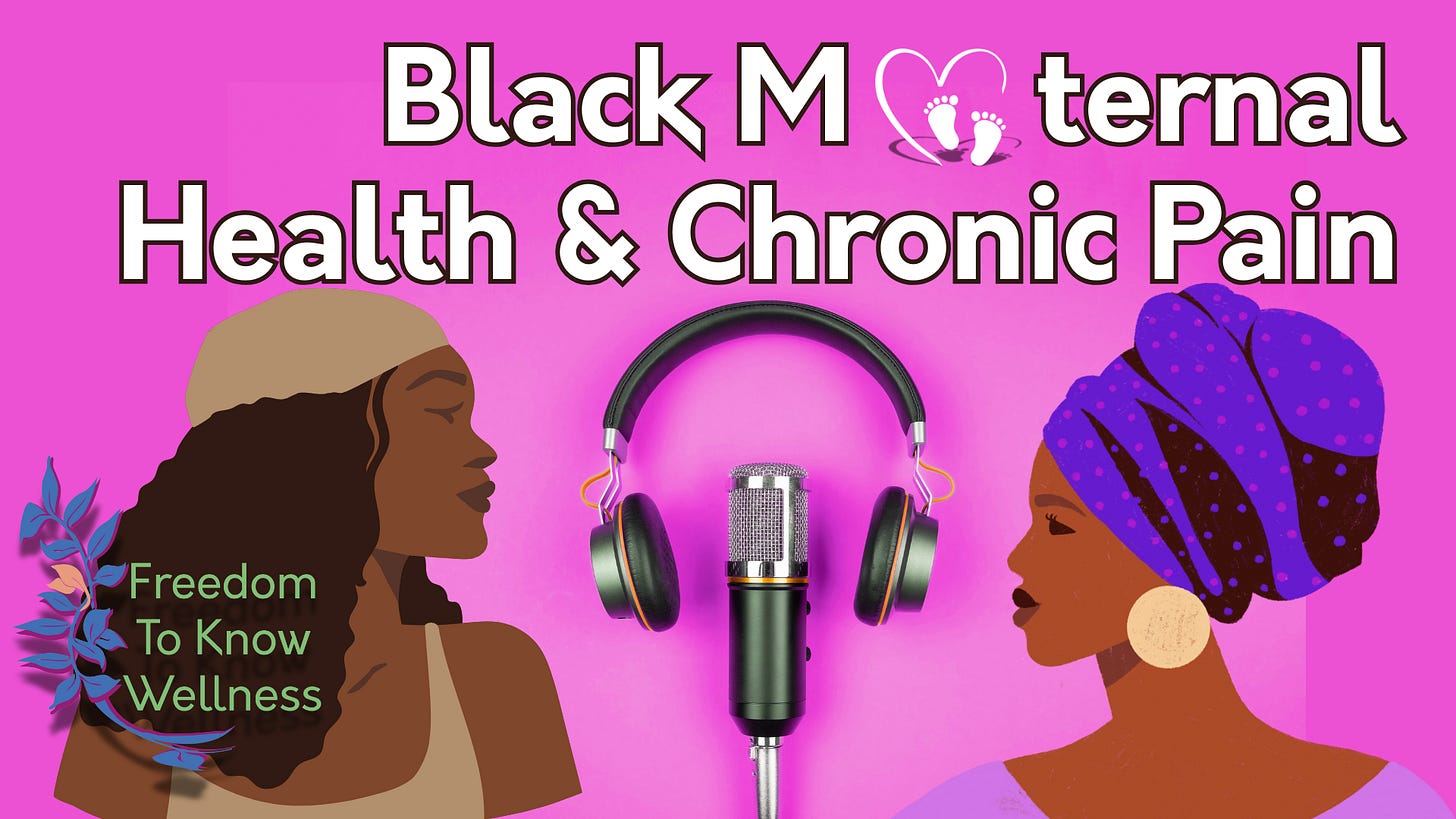Join the conversation with Freedom To Know Wellness in Season 2, Episode 1—an episode honouring Black Maternal Health Week, April 11–17. Hear one Black woman's powerful journey navigating chronic pain and maternal care within the Canadian healthcare system. She represents many Black women and Women of Colour who face a system often marked by neglect and medical gaslighting. A system built on biased standards—rooted in comparisons based on the race and gender of its original, dominant population.
This episode addresses the lack of inclusion in the Reference Intervals and medical testing to proactively support the care of Black and other people of colour in the medical system. Issues around care neglect and medical gaslighting towards Black people have led to the importance of Black-led medical care to support people of the African diaspora. A topic not often spoken about in the Canadian medical system, with the helm taken on by Black and other people of colour, namely women, voicing their lived experiences south of the border. Often being silenced or othered, Canadian Black women and other Women of colour are also speaking out on their lived experience in our medical system and its impact on their mental health.
“In Canada Preeclampsia rates in Black Women are 1:1 higher than White Women and in the USA preeclampsia rates in Black women are 60% more than their White counterparts.
Other minorities in Canada such as Hispanic and Indigenous women, also have an elevated risk of preeclampsia.”
Chronic Pain, Complex Conditions and Medical Gaslighting
People of all races can have both positive and negative experiences within the medical system. However, medical gaslighting disproportionately affects those with chronic pain and complex conditions—especially when their symptoms don't fit neatly into traditional diagnostic frameworks. The rarity and complexity of these conditions often lead to dismissal, misdiagnosis, or a lack of proper care.
What are Reference Intervals?
Reference Intervals (RIs), also known as reference ranges, are sets of values used to interpret medical test results. These values are typically based on measurements taken from a “healthy” population. But this raises a critical question: Which population defines “healthy”?
Historically, North American medicine was built on studies of Caucasian men—not even white women. While progress has been made to include female-specific data, many white women still express that the healthcare system fails to fully support their reproductive and overall health.
Even products used by women daily—such as sanitary napkins and cleaning supplies—can contain hormone-disrupting or harmful ingredients, many of which are not designed with female biology in mind. These products can contribute to reproductive issues like fibroids, polyps, and even undiagnosed cancers like ovarian cancer, which are often mistaken for digestive or menstrual disorders until it’s too late.
In Canada 🇨🇦 Ovarian Cancer often misdiagnosed with 44% mortality rates.
Ovarian Cancer rates are lower in Black Women but have HIGHER MORTALITY RATES due to being DIAGNOSED in LATER STAGES.
Inclusion Reference Intervals Standards to Meet Canada’s Multicultural Society
With Canada’s progressively multicultural population, its medical system and its practitioners need to be equipped understanding of medical test markers that meet the demands of this rapidly diverse and intermixed population. Have wider knowledge on what applies to which race and culture to provide the optimal medical care for its population, henceforth the individual. Medicine is not one size fits all, even when it comes to a person's race or gender, but having standard knowledge and being willing to do the additional genetic legwork, and apply the appropriate tests and prescribe the appropriate medications, supplements— even their dosage, can impact the individual’s quality of health.
A Personal Story: The Cost of Racial Assumptions in Medicine
A friend of mine, who is mixed-race, Caribbean South Asian and Caribbean Black, but presents as South Asian. She was encountering complex medical symptoms, which also didn’t. She began experiencing complex symptoms, and though she shared her full family medical history, doctors only pursued testing based on her appearance. Despite repeated visits and inconclusive tests, her symptoms didn’t match her South Asian markers, and her condition persisted.
Eventually, a doctor mentioned her symptoms resembled those of someone with sickle cell anemia. She immediately responded, “I’m half Black! Why wasn’t I tested for this earlier?” The doctor admitted they hadn’t considered it—because she didn’t look Black.
This story illustrates the dangerous impact of visual assumptions in medicine when not willing to do the extra legwork, the extra tests— even that one question to attain a cohesive diagnosis.. When we ignore lived identity and rely only on appearance, people fall through the cracks.
References Listed and Suggested Sites (Gender & BIPOC)
Dr.Lamide Oyewumi MD (OBGYN)
1780 Markham Road, Scarborough ON M1B 2W2
416 286 3830 ext 5
Cancer Incidence in Ethnicity (Journal)
Ethnocultural status and risk of preeclampsia in a Canadian setting (Journal)
Onepeople.TO - Cultural Wellness Care
Ovarian Cancer Rates (Journal)
Finding Your Power (Together) - Supporting Indigenous Youth to Thrive
Pathways to Wellness - Online Wellness Resource for Indigenous Students
ParentLove (@parentloveapp)
For Your Temple - Debbie Nichols-Skerrit (Instagram all appointments links available) (Facebook)
Episode Details
Timestamp
0:00 FTKWellness Intro
0:56 Facts On Black Maternal Health
2:27 Interview (Intro on Guest: Efia)
5:42 Chronic Pain, Advocacy, Medical Gaslighting, Care, & Women of Colour
35:48 Anxiety and Silencing: Managing the Medical System
40:55 TTC/Pregnancy/ Chronic Pain/ Medical System & Race
48:47 Race & Medical System - Reference Intervals (RIs)
56:20 Black-led OB, Birth Mortality Rates, Maternal Collective Care
01:14:06 Partners Genes Impacting Pregnancy
01:17:12 Post-Partum Healing with Chronic Pain
🎵 Music: Hold You
Artist: Q-Black
Soundcloud
*Music rights owned by Freedom To Know Wellness*
Join the conversation by commenting below and share this episode with others.
Be Well 💜
Freedom To Know Wellness













Share this post